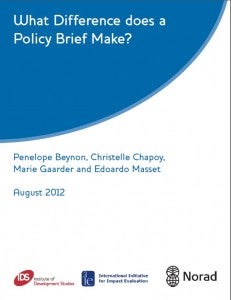 The International Initiative for Impact Evaluation (3ie) and the Institute of Development Studies (IDS) in collaboration with the Norwegian Agency for Development Cooperation just published a rigorous assessment – based on an randomized control design- that tries answer the question:
The International Initiative for Impact Evaluation (3ie) and the Institute of Development Studies (IDS) in collaboration with the Norwegian Agency for Development Cooperation just published a rigorous assessment – based on an randomized control design- that tries answer the question:
Do policy briefs affect readers’ beliefs?
The answers turn out to be not that reassuring:
Glass half empty version
We find that the policy brief had little effect on changing the beliefs of readers who held strong prior beliefs on entering the study, but had some potential to create evidence-accurate beliefs among readers holding no prior beliefs.
Glass half full version
The policy brief is more effective in creating evidence-accurate beliefs among respondents with no priors, than changing beliefs of respondents who already have an opinion
The impact of the policy brief seems to be independent of its specific form, but if it includes a research opinion and this is attributed to an authoritative source, impact is greater.
Our hypothesis was partly confirmed. We find a clear authority-effect on readers’ intentions to “send the policy brief to someone else” . We further find that the third treatment group (opinion piece without known author) is less likely to read the full report and seek out more information than the other groups.
But it seems that these actions tend to be actions which entail little effort (reread or resend the report) rather than actions that require more effort.
Interestingly, women are less likely to say they are going to act on the recommendations of a brief.
So, what are the takeaways?
- Don’t expect miracles
- Have clear messages
- Keep recommendations simple and actionable
- Consider whether a policy brief’s design or format is less appealing to women and/or makes them less inclined to take action
- Briefs are more likely to be shared if it quotes an authority. Just make sure your authority coincides to the readers’



Leave a Reply